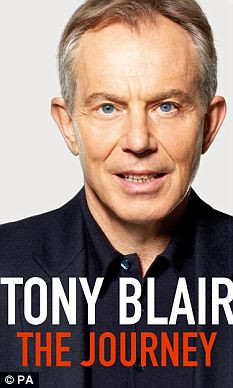Tony Blair's first book since 2010's A Journey is a fascinating treatise on leadership – though I suspect it will leave some of the cohort it is aimed at wishing he had delved deeper into his own experiences, turning a book of general interest into one of unique insight.
Before I expand, some disclosure. The political enmity between Labour and the SNP is so deep that for me to have expressed the slightest admiration for the former prime minister while I was still in frontline politics would have been nigh-on impossible. It would have sparked outrage among my supporters – just as it would be political suicide for an aspiring Labour politician to say anything positive about me. Indeed, this is one of the problems of our tribal politics that he, rightly, rails against.
However, now that I have stepped back from the frontline I can be more candid. While there is much that I disagree with Blair about – and on Iraq that disagreement is profound – I think history will, and should, judge him much more kindly than contemporary opinion does. Indeed, it is perhaps no accident that one part of the book that seems to come from a deeply personal place concerns the need for a leader to protect his or her legacy: “facts are still facts. But the colour, the interpretation, the framing of motive and impact, these are judgments, and the judges need at least to hear both sides.”
As the title suggests, this is a book about political leadership and, in particular, about leading a government. It addresses important questions: what are the attributes, skills and mindsets that make a good leader? What should leaders do – and avoid doing – to have the best chance of succeeding? Blair attempts to define a phenomenon – effective leadership – that is difficult to describe objectively, especially in the political world where, as he points out, no formal qualifications, experience or training are required. He offers up what is clearly intended to be a handbook, a kind of practical guide to good governance. Current and aspiring leaders are very obviously his target audience, and the advice he offers is sound. I found myself nodding along repeatedly.
Ironically, however, I suspect it will be those of us with actual leadership experience who find this book the least satisfying. It is not that his advice is wrong; on the contrary. But most leaders know that it is important to have a plan and stick to it, to manage time effectively, to prioritise, to understand the difference between tactics and strategy, to favour policy over politics, to be prepared to take unpopular decisions, and to follow through to delivery.
The problem is that much of this falls into the category of “easier said than done”. And while he pays lip service to this, Blair fails to address the myriad factors that, on a daily basis, conspire to throw a leader off course, or to offer any practical advice on how to overcome those challenges.
On Leadership would have been enriched immeasurably had he included a couple of case studies from his time in office, occasions when he struggled to follow his own advice, with some insight into how he managed – or failed – to get back on track. Indeed, one of the curiosities of this book is that there is no real reflection on his own strengths and weaknesses.
To be fair, he is upfront about this: “this is not a book about my qualities or lack of them as a leader. Rather, it is about what I have learnt.” I can understand his desire to separate his subject matter from the strong opinions that people hold about him. But I think that this would have been a better – and more useful – book had it made more of a connection between the two parts of that quotation.
There are other curiosities buried in the pages. Unintended insights into his worldview, perhaps. He proclaims that “democracy is the best and highest form of government” and while I am sure he means it, he manages to give the impression that democracy is not a sine qua non; that if other forms of government could deliver more effectively, he would be open to them. One of the chapter titles – Democracy or Not, It’s All About Delivery – certainly suggests as much.
For a politician who claims to have been, with some justification, a radical leader, he also comes across as being very much in thrall to vested interests. Business knows best seems to be the mantra, and it should be as free as possible from tax and regulation. In this age of growing inequality and economic alienation, some thoughts on how leaders might harness the power of business to build good societies as well as strong economies would have been illuminating.
He is truly myopic when it comes to the power of technology, and AI especially – and he presents as something of a fanboy when it comes to the Elon Musks of this world. To be clear, I agree with him completely about the transformative potential of AI and the need for leaders to embrace it. However, instead of simply noting, as he does, that “there are mind-boggling risks in all this” and leaving it at that, I wish he had offered some views on what those risks are, and how they might be mitigated.
The best bits of the book – and they are genuinely very good – are the passages offering advice on how to cope with the personal burdens of leadership, from dealing with the pressures of social media, to developing a hinterland, avoiding hubris, and knowing when to leave the stage.
There is much to learn from On Leadership, and I am glad Blair has written it. It will fascinate anyone interested in the art of governing, even in the abstract – and represents a good investment of time for anyone in or aspiring to political leadership. Indeed, I wish it had been available to me before I entered high office. Had he poured more of himself and his own experiences into it, though, and challenged his own thinking further, what is a good book might have been a truly great one.
This interesting, sometimes surprising book has a subject, but also an object. Yet the latter – its obvious target, and primary reader – is mentioned not once by name. Tony Blair has long reflected on leadership: what it means, how to do it well, how to cope with its pressures, when to relinquish it. But in the early autumn of 2024, this feels as much like a work of contemporary commentary as a handbook on governance.
He argues that leadership follows three stages. The first is when the new leader is listening eagerly; the second comes when they think they know everything, and finally, there’s a third stage of maturity when “once again, with more humility, they listen and learn”. The book’s purpose, he says, is to shorten the learning curve and get leaders to the third stage more quickly.
The first paragraph of the first chapter seems crafted to attract the attention of the reader Blair must surely have been thinking of most as he wrote it. It is a plea for a plan. A plan, he explains, “is a route map for governing. It sets out the destination, the milestones, and above all, the priorities… It focuses the mind of government. Indeed, in a certain sense it creates the mind of government.”
If that isn’t a conscious nod to Keir Starmer’s “mission government”, I’m a banana. As Starmer did in August, Blair argues that “it takes ten years to change a country” – during which two terms, a leader must be laser-focused on priorities that will change the lives of voters and able to relegate media criticism, second-order crises and all scandals other than lethal ones.
The missions, it seems, are all. Blair’s analysis of the debilitating lack of confidence inside today’s democracies, and the rise of populism – the politics of grievance, not solution – returns to the importance of delivering on concrete, clear improvements in daily life. Calm down. Stay focused. For if conventional democratic politics doesn’t seem to work, then whoever is promising the biggest shake-up and provokes the most outrage will succeed: “Everything in this book is designed to explain why delivery, making the change which works, is the only real test of government. But it is also the only way to protect democracy.”
Any book written by Blair, particularly one with leadership in the title, is going to rustle up the familiar critiques of his record, of which more later. But his qualification for writing this book goes beyond his decade as prime minister. Seven years ago he founded the Tony Blair Institute, and has since been crossing the globe advising other leaders in democracies and, more controversially, in non-democracies.
There is always the danger of a smug “leaders’ clubhouse” perspective on the world, which too casually dismisses outside criticism, and is too susceptible to the severe problems leaders face. Unsettlingly, Blair capitalises the word “Leader” throughout. Yet his institute has given him a perspective no other leading British politician can rival. Informed examples from Kenya, Estonia, Senegal, Korea, Singapore and many other countries abound. The result is a profoundly non-insular analysis. For anyone properly interested in modern politics, it will be, I suspect, vastly more important than the memoirs of a certain other prime minister, to be greeted with hysteria later this autumn.
Blair’s book is a guide full of practical advice from a man who has reflected on his own failures and successes – advice on how to select, shape and manage the best team; how to reorganise a torpid bureaucracy to deliver change; how to handle meetings; the importance of the diary and of time; the dangers of paranoia and arrogance; above all, how to distinguish between what matters and what it does not.
It’s an easy read. Along the way, we get insightful jokes and one-liners. Israel’s Shimon Peres, talking to a successor who is agonising about handling the peace process in the prime minister’s official residence in Jerusalem: “Look, you have a choice: you are here in this famous address as leader of the country. Do you want to be in the history book or the visitors’ book?”
Blair on AI technology: “Such things, once invented by human ingenuity, are never disinvented by human anxiety.” On feuds: “People fall out with you, but you should always be prepared to let them fall back in.” On decision-taking: “Calculate too much, and you miscalculate.” On law and order: “The characteristic people value most in any society is stability.”
All of this is useful and timely. If it is somehow Blair’s appeal for relevance in the time of Starmer, it deserves success. But that also requires a clear-eyed look at the darker side of his own record. On Iraq and Afghanistan, he admits a “fundamental miscalculation” in believing nations could be moved after invasion to democracy, despite the lack of proper institutions of government and the presence of religious sectarianism. “This was not an example of hubris in the sense of disdain for others or a belief in the overweening capacity of Western leadership to affect change,” he writes:
“It was a misplaced assessment that the world as it should be could be forged from the world as it is, and that democracy could be transplanted into a political body that was going to have multiple pressures to reject the organ. The belief in the inherent superiority of a democratic system gave us an exaggerated view of where, how and where it could take root.”
There is a touch of tragic realism here, albeit late. I quote this passage in full because I don’t think we have had quite this admission from Blair before. During the invasion of Iraq, when I was reporting on the politics of the war, there was plenty of similarly wise analysis from the Foreign Office in London and the State Department in Washington. I remember one senior official telling me that because of Iraq’s tribal and religious divisions, “You can’t just bomb it and then expect it to turn into Minnesota with palm trees.” They weren’t listened to.
What happened to Iraq was a catastrophe. We cannot, of course, know the terrible things that would have happened had Saddam Hussein remained in power, but a better understanding then about the dangers of demolishing states you disapprove of would have gifted us a safer world today. So when the author dismisses Robin Cook’s ethical foreign policy as foolish because “it implied a standard of morality that is completely inconsistent with the conduct of a country’s affairs in the real world” – and, to be fair, Blair explains lucidly why he thinks that – many readers will want to jam in their heels and argue.
Another big gap is the almost uncritical attitude to big corporations. The private sector is largely portrayed here as an admirable, politically neutral tool to modernise the state, with no understanding of its propensity for short-termism and gorging shareholders rather than investing, or ignoring the bigger social picture while driving towards monopoly.
This admiration for the private sector leads Blair into a curious political muddle over Elon Musk. Blair warmly (and justifiably) praises Musk as an extraordinary innovator who goes back to first principles with his cars and rockets. Elsewhere, there is a passionate, more predictable, passage about the venom and vitriol saucing social media, and the importance for political leaders of ignoring it. What, then, of the Elon Musk who gleefully tells his 195.5 million followers that the UK is on the edge of civil war, who platforms extremists and taunts Starmer as an anti-free-speech fascist?
There is a lack of dots being joined here. The truth is that the private sector isn’t ever politically neutral. It produces as many dangerous megalomaniacs as democratic politics, with fewer handrails, and these days often with more influence. It seeks to gouge profit from public need. A book on political leadership really should have confronted that directly.
I have more sympathy for another contentious aspect of the book, which is the optimistic glow that descends whenever AI is mentioned. Blair is often teased by technophobes and pessimists for seeing artificial intelligence as the answer to everything. Here, he rather effectively doubles down. He gives clear examples of how this revolution can make government work better, for less money: “The task of the Leader is first to accept the magnitude of this ‘real world’ change, then to explain it, and finally to weave it into an exciting and enthusing political narrative.” At a time when, as he says, healthcare systems are teetering on the brink, criminal justice systems are dysfunctional, planning is slowing down essential infrastructure projects and yet traditional tax-and-spend answers aren’t available, he is surely right about most of this.
Will he be heard? This part of the book is less for Keir Starmer or Rachel Reeves than Peter Kyle, the Science Secretary and, on health, Wes Streeting. But AI is going to be vastly important, and is perhaps the aspect of Westminster’s next decade that is least predicted or understood by conventional political journalism.
Tony Blair is never going to be uncontroversial. He is coming back into fashion, but he will not be hugely popular again. He is a deeply thoughtful, highly experienced and self-critical man who deserves to be taken seriously by anyone interested in how democratic power is effectively wielded. I hope, very much, that his unacknowledged primary reader, one Keir Starmer, opens this and does more than rifle through.
TV host Amol Rajan held Tony Blair to account on BBC Two this evening after he admitted he is “powerless” to help those fearing mass immigration and a rapidly changing “technology revolution”.
Rajan questioned the former Labour Prime Minister, who governed Britain from 1997 until 2007, over claims of being “insensitive” - something which Blair denied. The presenter went on to highlight that some Britons have seen their communities change completely in the space of a single generation and “feel a profound sense of cultural loss”, while also challenging Blair on the rapid global technological growth - including artificial intelligence (AI).
“We don't like the way the world is changing and want things to slow down,” Rajan told him. “What excites you horrifies us!”
Blair replied that he “can't stop people from losing their jobs due to [new] technology” or ease their anxieties about mass immigration. “I'm super-sensitive to the anxieties,” he continued, “but I'm not going to say I can protect you from the way the world is changing because I can't.”
Viewers exploded as they took to Twitter to vent their frustrations about the former Prime Minister's attitude and track record as a leader. Blair had suggested that “rules” and “control” over immigration would help - but viewers disagreed.
“Excuse me #TonyBlair, there are people that absolutely want to stop #Immigration and reverse it to pre 1997 when you lost control,” one exclaimed.
“I now live in an area where I am the only English person, how is that progress, it's loss of UK culture. You destroyed the #UK.”
“Oh yes, #TonyBlair, the man that destroyed the country but finds a way to justify what he did, and now the #UK will never be the same again, my child goes to a school with 43 languages and none of them receive the education they should,” a second viewer chimed in.
A third lamented that Blair had “mocked the post-Brexit migration boom”.
Some were so open-mouthed by Blair's comments that they questioned whether it was an “AI-generated interview”.
Rajan suggested that Blair made a “powerful moral argument”, after he argued that “life expectancy is higher than ever before” due to globalisation.
Blair added: “We're going to slow growth... and do ourselves a lot of damage if we don't [embrace globalisation].”
He added that by introducing “rules” around immigration, it would give people a sense that it was “controlled” and make them feel more comfortable about it.
Meanwhile, discussing the explosion of AI, he was accused of dismissing people's fears after arguing: “In the 19th century there were a lot of people who didn't want the industrial revolution but you're not going to stop it.”
He added: “It doesn't mean just let it happen - you need to reskill people and invest in education.”

















